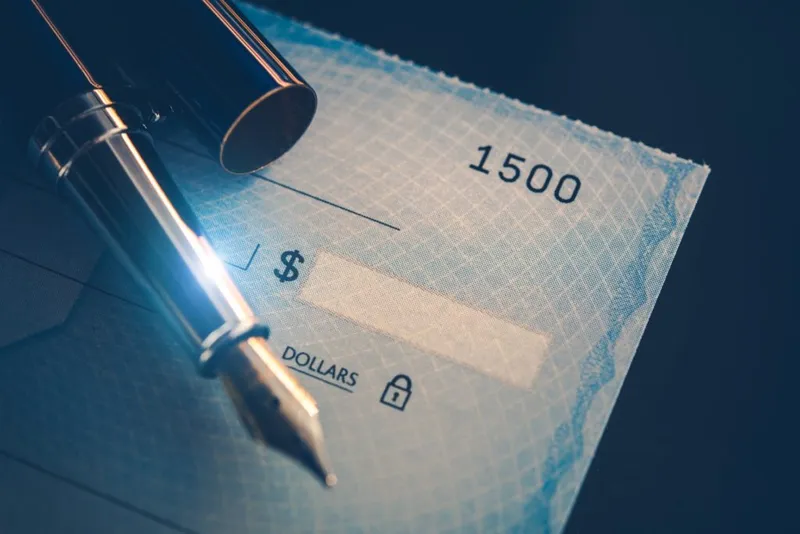
If you are waiting for your settlement check, you may be wondering, how long can a lawyer hold money in escrow?
Litigation can last for months or years, so you probably felt excitement when you finally reached a settlement.
However, your settlement award may be harder to access than you imagined.
For instance, some lawyers hold your settlement check for months, delaying your access to the cash you need.
The settlement check timeline is one more hurdle you must overcome in resolving your claim. So, how long can a lawyer hold money in trust? how long can escrow hold funds?
The team at Ally Lawsuit Loans gives you an overview of the settlement check process below.
If you have questions or wish to schedule a free consultation, contact us today.
Four Steps In the Settlement Check Process
To get your settlement check, you must resolve these four matters in the settlement check process.
1. Signed Release Forms
When you reach your settlement, you must sign a release form. This form is a legal document that states you will not pursue further legal action on the same claim.
Expect to sign a release form for each defendant in your claim.
Your lawyer will carefully review the terms of the release form before you sign, and you can request modifications if necessary.
2. Delayed Payment
State law should give the defendant a timeline for paying the settlement.
Some defendants wait until the last moment allowed by state law to pay your settlement, causing delays in receiving the money you’re owed.
3. Check Clearance
When the defendant pays your settlement, the money goes to your lawyer, who holds it in an escrow account.
How long can a lawyer hold your settlement check? The check may take up to a week to clear, and then the funds are available to pay debts.
Once the check clears, your lawyer takes their fee from the funds and next pay other liens and lawsuit-related bills.
4. Settlement Lien Payment
During your lawsuit, parties may have placed liens on your settlement. A lien gives someone else the right to your property to pay a debt.
For example, if you have unpaid medical bills, the hospital or doctor may place a lien on your settlement.
Your lawyer will also use your settlement funds to pay expenses related to litigating your case, including:
- Expert witness fees,
- Private investigator fees, and
- Medical examinations.
Your lawyer can quickly pay most liens on your account once settlement funds are available.
However, government liens, such as those from Medicaid, can take longer to resolve.
After your money moves through these four steps in the settlement check process, your lawyer sends the remaining balance to you.
Unfortunately, delays at each step can cause you to wait weeks or even months for access to your settlement funds.
How Are Settlement Funds Disbursed?
Before you even get your settlement check, you may be wondering where settlement funds go before you receive it.
After payment, it's customary for settlement funds to be deposited directly into your attorney's trust account, from which the funds are then distributed according to the agreement. Below are the various ways in which funds are typically disbursed:
- Attorney Fees -- Depending on the fee structure your attorney agreed to, lawyers will take the agreed percentage from the settlement amount.
- Legal Expenses -- Legal teams may cover expenses related to your case, such as expert fees, filing fees, travel expenses, etc.
- Third-Party Expenses -- Any outstanding medical bills or liens tied to the settlement are settled before you receive the remaining disbursement.
- Pre-Settlement Funding -- If you received a lawsuit loan while your case was pending, this legal funding will be paid off before you receive your settlement money.
- Client Funds -- Your share of the settlement is disbursed once all other expenses and obligations are settled.
For More In-Depth Information About Settlement Disbursement, Read Our Blog: How Are Settlement Funds Disbursed?
Access Your Settlement Funds Faster
No credit check. Fast approval. Lowest rate.
Access Settlement Funds Faster with Ally Lawsuit Loans
If you need access to your settlement check sooner, Ally Lawsuit Loans can help. Ally Lawsuit Loans offers cash advances on your lawsuit settlement.
You pay back the cash advance when you receive your settlement.
Here are some things you should know about Ally Lawsuit Loans:
- We offer the lowest rate guarantee in the industry;
- You pay nothing back if you lose your case; and
- You can qualify for a lawsuit loan within 24 hours.
To find out more about getting a lawsuit loan or to start your application, contact Ally Lawsuit Loans.
You shouldn’t have to stress while you wait for the slow settlement check process, so we’re here to make the wait easier.


